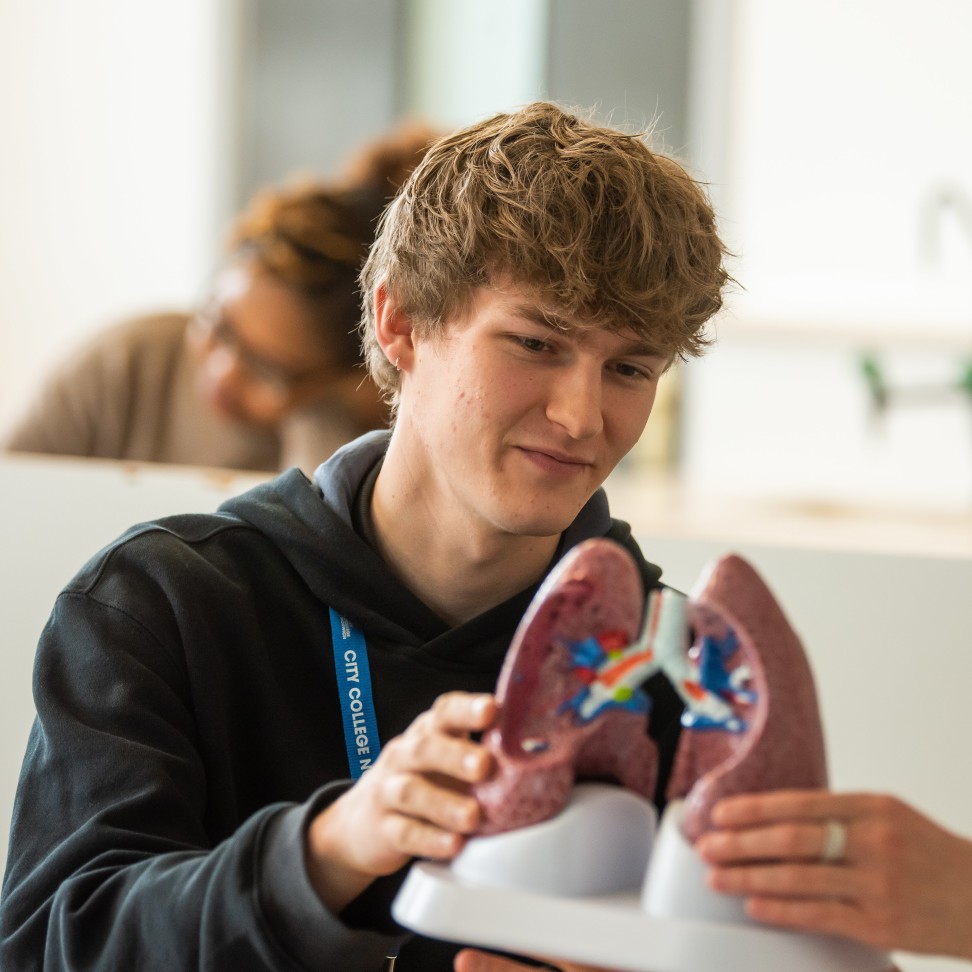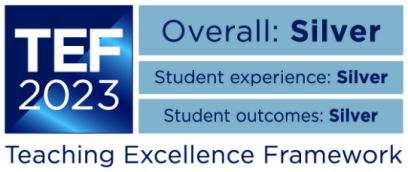FdSc Health Studies

If you are excited to develop a career in healthcare, FdSc Health Studies could be the perfect place to begin. This programme will develop your practical skills, gaining hands-on experience alongside your learning, and opens up doors to a wide array of career opportunities within healthcare.
- Level
- 5
- Entry Point
- Sep 2026
- Duration
- Full Time, 2 years
- Venue
- Norfolk House campus
- UCAS Course Code
- B900

Reasons to study
this course
As a college we have a well-established partnership with the local NHS Trusts and have worked alongside them to develop this course to maximise your career development and progression pathways available within the sector.
The course is a nationally recognised qualification that allows you allows you to demonstrate your practical skills to employers to further your employment and career goals.
The course is designed to run over one day a week, allowing you to easily plan and work whilst you study. The college timetable also reflects the major school holidays, so it is supportive of people who have family responsibilities to also study.
You will complete 460 hrs of placement on this programme, so it is important that you have access to healthcare work during the course. If you are not already in a suitable role (either paid or voluntary), we can support you to find a suitable placement.
Our groups are small so it allows us to get to know you and provide effective support.

Alex Guy - Course Leader FdSc Health Studies
My name is Alex and I am the course leader for FdSc Health Studies. I started my academic journey completing a UEA validated degree at City College Norwich in Sport, Health and Exercise; in addition, I have completed my Diploma in Education in Training. More recently, I have been awarded Senior Fellowship by Advance HE; this is provided to individuals that have demonstrated a comprehensive understanding and effective practice that provides a basis from which they lead or influence the learning and teaching practices of others.
My current role is a Higher Education Curriculum Lead, where I have responsibility for our staff and quality of provision across a range of programmes. I have overseen provision in Trainee Nursing Associates, Health Studies, Mental Health Practice, Social Work, Youth Work, Psychology with Sociology, English, Childhood and Youth Studies, Early Childhood Studies and Additional Needs and Disabilities.
Contact course leaderWhere will this
course take you?
Completion of this course puts you in great stead to be successful in a wide variety of career paths. Some examples include:
- Physiotherapy
- Speech and language therapy
- Nursing
- Radiography
- Podiatry
- Operating department practitioner
- NHS management
- Third sector provision
Many of these are also offered by the NHS trusts locally as apprenticeships following on from this course.
Student stories
Course structure
This course is studied full time over two years. This programme is delivered over one day a week (9am-5.30pm) - 30 teaching weeks per year.
Level 4 modules
Academic and Professional Skills Compulsory
Professional and Academic Skills is a core module designed to aid your success in your programme of study.
This module aims to:
- Provide a framework of professional and academic skills at undergraduate level
- Promote your recognition of the value of research, critical analysis and reporting in the context of your programme specialism
- Aid in the identification and development of a developmental approach to learning and to the professional skills required for employment
Having completed this module, you should be able:
• To use a range of academic approaches and techniques
• To reflect on your personal performance and development in a range of professional and academic skills.
• To apply appropriate judgement in selecting and analysing academic sources and data
• To communicate effectively with peers, assessors and wider audiences in a variety of media
• To apply the Harvard Referencing System correctly and consistently in work products
• To meet the professional standards for graduate employment your industry/career path
Assessment:
-
Group presentation (50% of module weighting)
-
Reflective Journal (50% of module weighting)
Cognitive and Biological Skills Compulsory
This module presents the anatomical and biological foundations of health across the life span as a dynamic process. The core of the course is concerned with an integrated study of human biology, drawing on the disciplines of anatomy, physiology, molecular biology. This provides an underpinning knowledge of how the body works. This module will also introduce the brain and basic brain physiology linked to practice.
Assessment:
- Exam (100% Module Weighting)
Health and Nutrition Compulsory
A good diet is essential for life and health. Food supplies the raw materials necessary for growth, from a single cell to a full-grown adult, and at all stages of the life cycle. Nutrients are required to maintain the body’s functional state, enabling repair and replacement of tissues and the continuance of good health. Studying this module offers you an opportunity to explore the connections between food constituents, diet, good health, and ill health with an emphasis on relevant disease states. This module will explore the concept of a ‘healthy diet’ and how it varies for different patient populations.
Assessment:
-
Essay (Module Weighting 100% )
Practice and Policy in Healthcare Core
The health and social care sector is sensitive to change, and the sector is affected by the political, social, legal, and economic environment. The purpose of this module is to explore past and current factors that impact the design and delivery of health services. You will explore key debates and trends within health and examine the influence of policy and practice initiatives. This module is designed to enhance your commercial awareness of health practice, and reflect upon the strategic development, environment, and delivery of services both now and in the future. You will develop a foundation knowledge of the sector in which you are, or aim to practice, within. This module will examine and explore the principles of healthcare delivery and the philosophies of care that enables safe and effective practice.
You will explore more than one key debate or trend within health care practice, and will consider its impact on the wider health and social care sector. You are encouraged to explore debates by referring to current research, developments in the law, policy initiatives, political issues, social change, and the economic environment. You will reflect upon the changing nature of the sector and examine its strategic environment.
Assessment:
-
Essay (Module Weighting 100%)
Law Ethics and Safeguarding Core
Ethical and legal issues associated with the provision of health care in the UK are becoming increasingly complex and have much influence on professional practice, accountability and individual responsibility. Practitioners are frequently required to differentiate between the law and personal values in order to discharge their duty of care within an increasingly litigious and challenging environment. This module provides opportunities for you to explore ethical and legal issues in relation to relevant laws, codes of practice, theories, personal value systems and beliefs. You will be encouraged to reflect upon your own professional practice to explore professional, ethical and legal responsibilities, rights, and accountabilities. Practitioners need an understanding of safeguarding in practice – their roles and responsibilities to safeguard adults and children.
Assessment:
-
Professional Discussion (Module Weighting 100%)
Person Centred Care Core
This module will allow you the opportunity to consider different approaches to communication in healthcare and the impact that this will have when working with different people. Multidisciplinary and multiagency working involves appropriately utilising knowledge, skills and best practice from multiple disciplines and across services; you will explore the effectiveness of these when providing care. There will be a strong focus on ensuring fair treatment and opportunity for all, considering ways in which all individuals are treated with dignity, across the lifespan.
Assessment:
-
Presentation (Module Weighting 100%)
Level 5 modules
Human Pathology Compulsory
Pathology is a scientific discipline which involves the study of disease and provides an understanding of the causes of disease, the underlying mechanisms and potential treatment and complications of disease. This module will develop on the knowledge gained in the Cognitive and Biological Systems module studied at level 4, and will investigate the main causes of disease and illness.
This module will give an overview of the disease processes that affect humans, leading to an appreciation of the wide range of diseases that you may encounter in a practice environment. You will gain an understanding of general pathology and an appreciation of the causes and processes that lead to the onset and outcomes of human disease. This module will explore the impact of science on disease occurrence and how this has improved practice and health outcomes.
The module will examine the role of health promotion in supporting the health and wellbeing of individuals across the lifespan. The aim is to develop a critical awareness of the key concepts, debates, and approaches in health promotion, exploring it relevance in contemporary practice. You will explore the role of the professional in supporting behaviour change, using evidence-based approaches, theory, and models. You will also explore the importance of monitoring and evaluating the effectiveness of health promotion activities.
You will also examine your role in promoting the health and wellbeing of patients/service-users in day-to-day practice, such as proving health education, advice, and guidance. There will be a focus on exploring local and national health priorities, and policy, and the role health promotion plays in addressing these priorities.
Assessment:
- Essay (Module Weighting 100%)
Service Improvement Core
This module focuses on the principles and practices of service development, emphasis will be placed on enhancing patient safety and quality of care through research and leadership. It is designed to equip you with the knowledge and skills to effectively contribute to continuous service improvement of healthcare services to enhance the quality and efficiency of healthcare delivery.
Central to this module is the engagement with practice-based research. You will develop their ability to read, assess, interpret, and apply research specifically in the context of the healthcare. You will gain insights into various methodological approaches that bridge the gap between evidence and practice.
Leadership is another critical focus of the module. You will examine the roles of supervision and leadership in the NHS, developing the knowledge, skills, and behaviours associated with effective leadership. You will study different leadership styles and approaches within the health and care sector, reflecting on your own leadership potential and the impact of leadership on service development. By understanding the nuances of leadership in healthcare, you will appreciate the importance of personal and professional development in achieving high-quality practice, and be better prepared to lead teams and initiatives that drive service improvement.
Clinical governance is another critical area of focus, with you having the opportunity to explore its role in enhancing practice quality. You will investigate the pillars of clinical governance, including clinical audit, research and development, education and training, and risk management.
Assessment:
- Service Develop Plan (Module Weighting 60%)
- Viva Discussion (Module Discussion 40%)
Human Growth and Development Compulsory
This module provides you with an introduction to the key theories of human development. There are many different theoretical approaches regarding human development, and this module will cover a holistic approach; we will cover physical, cognitive, and psychosocial development of humans throughout the lifespan, covering from conception to old age. We will explore the growth of individuals throughout the lifespan and consider the impact of decline. You will need to give consideration to the issues that practitioners will encounter relating to physical, cognitive, and psychosocial development growth and decline.
Assessment:
-
Case Study (Module Weighting 100%)
Anthropometry and Recovery Compulsory
This module provides the opportunity for you to focus on practice-based measurements of the human body and how they apply to the practice decisions involved in patient care. It focuses on screening measurements that can be taken and how the accuracy of those measurements is critical. This will explore how these are applied in an individual patient approach. Comparison of techniques to measure the same variable will be looked at, how the correct methods could be chosen, and how this may vary from patient to patient. This module builds on the knowledge already acquired in Cognitive and Biological Systems and Health and Nutrition at Level 4, alongside Human Pathology at Level 5. Recovery and rehabilitation will be considered, and how knowledge from the measurements taken lead to treatment and advice given to patients. This will look at the safety aspects of measurements, including the unintended consequences of testing.
Assessment:
-
Practical Exam (Module Weighting 70%)
-
Professional Discussion Module Weighting 30%)
Professional Practice Core
This module will provide the opportunity for you to demonstrate and discuss the duties of an Assistant Practitioner, which are underpinned by the Assistant Practitioner Occupational Standards. This module will take a holistic approach and provide the opportunity to bridge the gap between theory and real-world application, supporting professional competence and workplace readiness.
Assessment:
-
Observation of Practice (module weighting 50%)
-
Professional Discussion (module weighting 50%)
Course details
Assessment methods
Assessments are varied and innovative and are aimed to develop transferable skills to support employability. They include: essays, journals, individual and group presentations, academic posters, reports, portfolio/CPD building, professional discussion, examination, and exhibitions. Each module assessment has been considered alongside the knowledge, skill, and behaviours required in practice. Therefore, assessment activities have been designed to encourage theory-practice links, and to develop transferable employability skills specific to the sector.
Awarded by
This course is awarded by the University of East Anglia and regulated by The Office for Students.


Entry requirements
UCAS points
Our typical offer is 64 UCAS tarrif points.
GCSEs
A minimum of grade 4 / C is required in GCSE English and Maths.
BTEC
UCAS tariff points from BTEC are accepted.
Scottish Highers
UCAS points from Scottish Highers or Advanced Levels are accepted.
City and Guilds
City and Guilds diplomas are accepted.
Open University
Open University credits in lieu of A Levels are accepted.
Access to HE Diploma
Access to Higher Education Diplomas are accepted.
T Levels
T Levels are accepted.
Desired Subjects
Subjects studied with a scientific element are desirable.
Contextualised Offer
You may also be eligible for a contextualised offer for this programme, please see our Contextualised Offer page for further details and to check your eligibility.
We will also accept applications from students who have passed, or are predicted to gain a pass grade, in the following specific course programmes:
- T Level: Health (Supporting the Adult Nursing Team)
- T Level: Health (Supporting the Mental Health Team)
- BTEC Health & Social Care Extended Diploma Level 3
- Access to Higher Education: Science (Health), Level 3
- Access to Higher Education: Health Professions, Level 3
Applicants over 21 years of age, who do not have relevant UCAS points, will be reviewed on a case-by-case basis but should demonstrate evidence of an appropriate qualification, experience in the field, or a strong interest.
Course fees
£9,535 per year for UK students.
£15,052 per year for international students (students from outside of the UK).
We were awarded a TEF Silver rating overall in 2023, achieving this for both student experience and student outcomes.

Search courses
Search CCN HE





